
FACULTY OF ARTS AND SCIENCES
Department of Sociology
SOC 310 | Course Introduction and Application Information
| Course Name |
Islam and Gender in Turkey
|
|
Code
|
Semester
|
Theory
(hour/week) |
Application/Lab
(hour/week) |
Local Credits
|
ECTS
|
|
SOC 310
|
Fall/Spring
|
3
|
0
|
3
|
6
|
| Prerequisites |
None
|
|||||
| Course Language |
English
|
|||||
| Course Type |
Elective
|
|||||
| Course Level |
First Cycle
|
|||||
| Mode of Delivery | face to face | |||||
| Teaching Methods and Techniques of the Course | DiscussionQ&ALecture / Presentation | |||||
| Course Coordinator | - | |||||
| Course Lecturer(s) | ||||||
| Assistant(s) | - | |||||
| Course Objectives | The objective of the course is to present the continuities and changes in the discourse and regulation of gender and sexuality in the Ottoman-Turkish history. The legal-institutional discourses/regulations as well as everyday experiences of gender and sexuality in the Ottoman-Turkish society will be investigated via historical sources, cultural texts and related literature. Accordingly, the position of women, same-sex relationships and gender roles will be discussed in terms of their relationship mainly to Islam, patriarchy, state, modernization and neo-liberalism. |
| Learning Outcomes |
The students who succeeded in this course;
|
| Course Description |
|
|
Core Courses | |
| Major Area Courses |
X
|
|
| Supportive Courses | ||
| Media and Management Skills Courses | ||
| Transferable Skill Courses |
WEEKLY SUBJECTS AND RELATED PREPARATION STUDIES
| Week | Subjects | Related Preparation |
| 1 | Inroduction to the course | |
| 2 | Orientalism? Ethno-centricism? Cultural Relativism? | Ahmed, Leila (1982). Western Ethno-centrism and Perceptions of Harem, Feminist Studies 8, no. 3 , pp. 521-534. Tucker, Judith T. (1990). Traveling with the Ladies: Women's Travel Literature from the 19th Century Middle East, Journal of Women's History, Volume 2, Number 1, pp.245-250. |
| 3 | Approaching Ottoman Women I: Islam and Legal Text | Aydin, M. Akif (2017). Türk Hukuk Tarihi, pp.65-99. Zeevi, D'ror (2006). Regulating Desire: Shari'a and Kanun, in Producing Desire, pp.48-77. Imber, Colin (1997). Women, Marriage and Property, in Women in the Ottoman Empire, pp. 81-105. Tucker, Judith E. 1997).The Fullness of Affection, in Women in the Ottoman Empire, pp.232-253. |
| 4 | Approaching Ottoman Women II-a: Islam and Everyday Practice | Gerber, Haim (1980), Social and Economic Position of Women in an Ottoman City, Bursa, 1600-1700, International Journal of Middle East Studies, Vol. 12, No. 3, pp. 231-244. Göcek&Baer (1997). Social Boundaries of Ottoman Women’s Experience in 18th century Galata Court Records, in Women in the Ottoman Empire, pp. 48-66. |
| 5 | Approaching Ottoman Women II-b: Islam and Everyday Practice | Faroqhi, Suraiya (2000). Kadιn Kültürü in Osmanlι Kültürü ve Gündelik Yaşam, pp. 115-139. Faroqhi, Suraiya (2002). Ottoman Men and Women, pp. 131-217 |
| 6 | Woman and Gender in Cultural 'Texts' I: Movie Screening | |
| 7 | Woman and Gender in Cultural 'Texts' II | Selected parts from Cevdet Kudret (eds.).Karagöz. Egilmez, D.Burcu (2017) Marriage, Family and Gender in Karagöz and Late Ottoman Istanbul, Fe Dergi. |
| 8 | Proposals and Feed Back | |
| 9 | Women and Gender on the Edge of Ottoman Modernization | Brummet, Palmira Johnson (2007).Gender and Empire in Late Ottoman İstanbul: Caricature, Models of Empire and the Case for Ottoman Exceptionalism, Comparative Studies of South Asia, Africa and the Middle East, Volume27, pp. 283-302. Zeevi, D'ror (2005). Hiding Sexuality, The Disappearance of Sexual Discourse in the Late Ottoman Middle East, Social Analysis, Volume 49, Issue 2, pp. 34–53. Başcı, Pelin (2003). Love, Marriage and Motherhood : Changing Expectations of Women in Late Ottoman İstanbul, Turkish Studies 4:3, pp. 145-177. |
| 10 | Turkish Modernization and Republican Women | Kandiyoti, Deniz (1991). End of Empire: Islam, Nationalism and Women in Turkey,in Women, Islam, and the State. D.Kandiyoti (ed.), pp. 22-48. White, Jenny B. (2003). State Feminism, Modernization, and the Turkish Republican Woman, NWSA Journal, Vol. 15 No. 3. Miller, Ruth A. (2007). Rights, Reproduction, Sexuality, and Citizenship in the Ottoman Empire and Turkey, Signs: Journal of Women in Culture and Society, vol. 32, no. 2. |
| 11 | Woman and Gender in Cultural 'Texts' III | The movie will be announced. |
| 12 | Turkish Feminism(s) | Sirman, Nükhet (1989). Feminism in Turkey: A Short History, New Perspectives on Turkey, 1-33. C Diner, Ş Toktaş (2010). Waves of feminism in Turkey: Kemalist, Islamist and Kurdish women's movements in an era of globalization, Journal of Balkan and Near Eastern Studies, pp.41-57. |
| 13 | Religion, Economy and Politics | S. Coşar, M. Yeğenoğlu (2011). New grounds for Patriarchy in Turkey? Gender Policy in the Age of AKP, South European Society and Politics 16:4, pp. 555-573. Ayşe Güneş Ayata and Fatma Tütüncü (2008). Party Politics of the AKP (2002–2007) and the Predicaments of Women at the Intersection of the Westernist, Islamist and Feminist Discourses in Turkey, British Journal of Middle Eastern Studies 35 (3). pp.363-384. Arat, Yesim (2010). Religion, Politics and Gender Equality in Turkey: implications of a democratic paradox?, Third World Quarterly, Vol. 31, No. 6, pp 869–884. |
| 14 | Presentations | |
| 15 | Presentations | |
| 16 | Presentations |
| Course Notes/Textbooks | |
| Suggested Readings/Materials |
EVALUATION SYSTEM
| Semester Activities | Number | Weigthing |
| Participation |
1
|
10
|
| Laboratory / Application | ||
| Field Work | ||
| Quizzes / Studio Critiques | ||
| Portfolio | ||
| Homework / Assignments |
1
|
10
|
| Presentation / Jury |
1
|
15
|
| Project |
1
|
25
|
| Seminar / Workshop | ||
| Oral Exams | ||
| Midterm | ||
| Final Exam |
1
|
40
|
| Total |
| Weighting of Semester Activities on the Final Grade |
4
|
60
|
| Weighting of End-of-Semester Activities on the Final Grade |
1
|
40
|
| Total |
ECTS / WORKLOAD TABLE
| Semester Activities | Number | Duration (Hours) | Workload |
|---|---|---|---|
| Theoretical Course Hours (Including exam week: 16 x total hours) |
16
|
3
|
48
|
| Laboratory / Application Hours (Including exam week: '.16.' x total hours) |
16
|
0
|
|
| Study Hours Out of Class |
15
|
3
|
45
|
| Field Work |
0
|
||
| Quizzes / Studio Critiques |
0
|
||
| Portfolio |
0
|
||
| Homework / Assignments |
1
|
20
|
20
|
| Presentation / Jury |
1
|
15
|
15
|
| Project |
1
|
24
|
24
|
| Seminar / Workshop |
0
|
||
| Oral Exam |
0
|
||
| Midterms |
0
|
||
| Final Exam |
1
|
28
|
28
|
| Total |
180
|
COURSE LEARNING OUTCOMES AND PROGRAM QUALIFICATIONS RELATIONSHIP
|
#
|
Program Competencies/Outcomes |
* Contribution Level
|
||||
|
1
|
2
|
3
|
4
|
5
|
||
| 1 | To have the knowledge of classical and contemporary theories in sociology, and be able to comparatively analyze these theories. |
|||||
| 2 | To have the knowledge of main methodological approaches in sociology as well as social research and data analysis methods. |
X | ||||
| 3 | To have knowledge in the fields of general sociology, sociology of institutions, social structure and change, and applied sociology. |
|||||
| 4 | To be able to determine the appropriate methods in the design of the planning stage and conclusion of a sociological project, individually or as part of a team. |
X | ||||
| 5 | To be able to diagnose the social dynamics behind personal problems by using sociological imagination. |
X | ||||
| 6 | To be able to define social problems at local, national, and global level, and offer new policies for solutions. |
X | ||||
| 7 | To be able to apply commonly-used computer programs for data collection and analysis in sociological research. |
|||||
| 8 | To be able to develop a socially responsible, scientific and ethical perspective regarding the collection, analysis, interpretation and presentation of data. |
X | ||||
| 9 | To be able to analyze different aspects of the social world by drawing on the knowledge produced by other disciplines of the social sciences. |
|||||
| 10 | To be able to constantly renew herself/himself professionally by following scientific and technological developments in sociology and social research. |
|||||
| 11 | To be able to collect sociological data and communicate with sociologists and other social scientists in a foreign language ("European Language Portfolio Global Scale", Level B1). |
|||||
| 12 | To be able to speak a second foreign at a medium level of fluency efficiently. |
|||||
| 13 | To be able to relate the knowledge accumulated throughout the human history to their field of expertise. |
X | ||||
*1 Lowest, 2 Low, 3 Average, 4 High, 5 Highest
NEWS |ALL NEWS
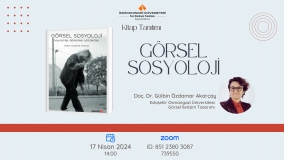
Book Presentation and Talk: Visual Sociology
Department of Sociology invites you to the Book Presentation and Talk event with Gülbin Özdamar Akarçay, the author of “Visual Sociology". Date:
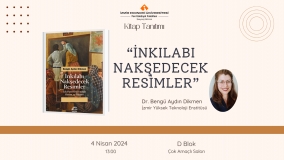
Book Presentation and Talk: Painting the Revolution
Department of Sociology invites you to the Book Presentation and Talk event with Dr. Bengü Aydın Dikmen, the author of “Painting the
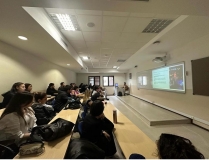
We welcomed ethnomusicologist Onur Sönmez.
We held our sociology seminar where we hosted ethnomusicologist Onur Sönmez. We thank him very much for this detailed and interesting presentation.
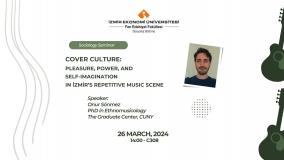
Cover Culture: Pleasure, Power, and Self-Imagination in İzmir’s Repetitive Music Scene
You are cordially invited to the Sociology Seminar where we will host Dr. Onur Sönmez. Onur Sönmez has a PhD in ethnomusicology
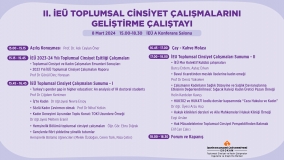
II. IUE GENDER STUDIES DEVELOPMENT WORKSHOP (EKOKAM- Gender and Women’s Studies Research and Application Center)
Research Assistant Helin Kardelen Kavuş attended the “II. IUE Gender Studies Development Workshop” on March 8, 2024, International Women's Day. Organized by EKOKAM, the workshop
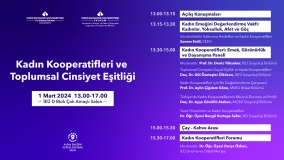
Women’s Cooperatives and Gender Equality
You are cordially invited to "Women's Cooperatives and Gender Equality", which will be co-organized by IUE EKOKAM, the Department of Sociology, and
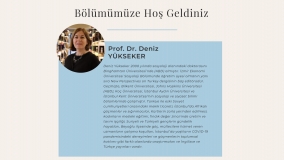
Welcoming Our New Faculty Member: Professor Deniz Yükseker
We are proud to welcome and introduce our newest faculty member: Professor Deniz Yükseker. We wish her all the best and success
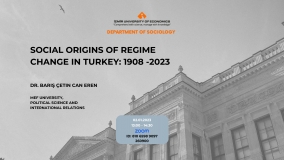
Sociology Seminar: Social Origins of Regime Change in Turkey: 1908 -2023
Department of Sociology cordially invites you to a seminar on "Social Origins of Regime Change in Turkey: 1908 - 2023" by Dr.



